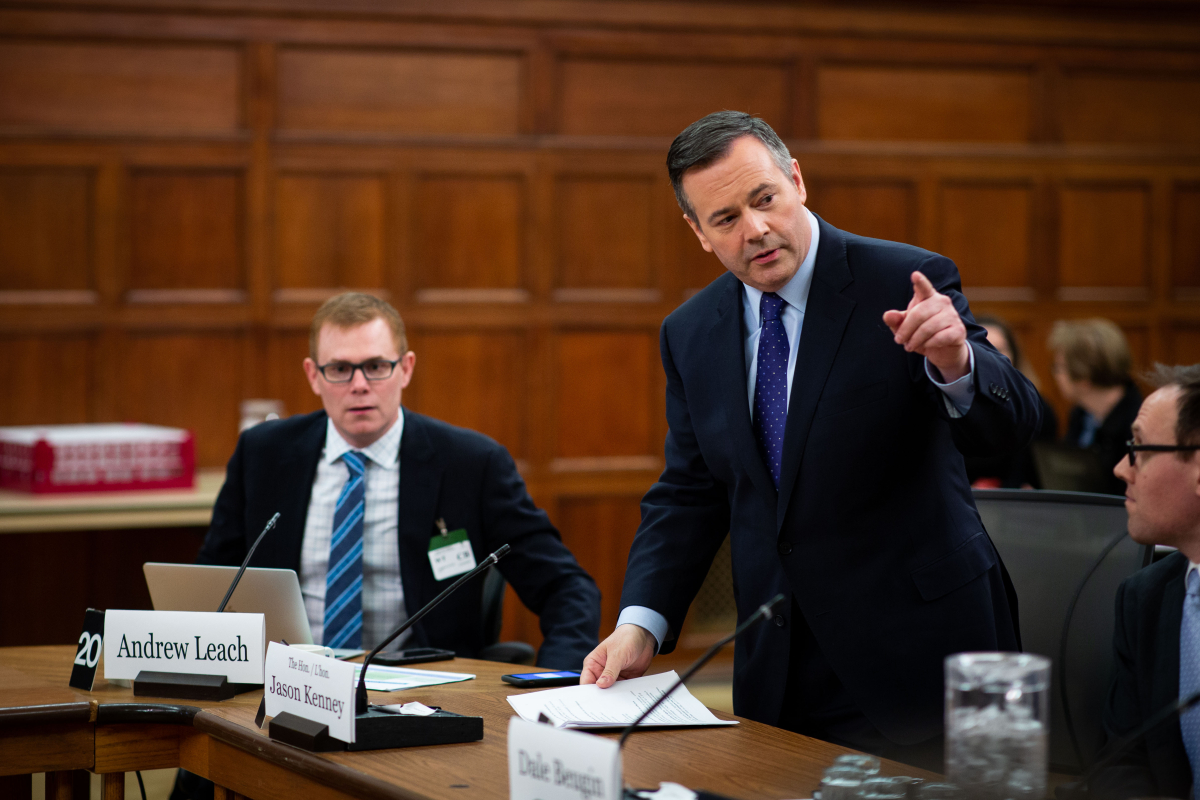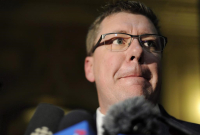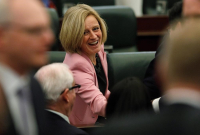Thank you for helping us meet our fundraising goal!
Jason Kenney defended his stance questioning the degree to which humans are causing climate change in front of a Parliamentary committee on Monday.
The leader of the Alberta opposition United Conservative Party has vowed to repeal the province’s carbon pricing regime if elected to power in the 2019 election — a move backed by his party at a convention over the weekend.
Kenney has also said he will join a Saskatchewan court reference in challenging any federal tax. On Monday, he appeared in front of the House of Commons finance committee to reject the Trudeau government’s Greenhouse Gas Pollution Pricing Act, which is contained within the bill the committee is now studying.
Kenney has said that while he agrees humans are causing climate change, he also believes there is a “legitimate range of perspectives about exactly to what degree” humans are responsible.
“Are you saying that there’s merit to the argument, or the question, of human activity that causes climate change?” asked Liberal MP committee member Jennifer O'Connell, citing that quote. “No,” Kenney responded.
“Then why do you say these things?” O’Connell shot back. “Do you say these things for political attention? Why do you say them, if you don’t think they’re true? How do I know what you’re saying here today is true?”
“Mr. Chair, the member quoted me, then asked a different question,” Kenney protested. “I have said that there is a debate of the precise degree to which there are anthropogenic (human-caused) causes of climate change. I agree with the scientific consensus that there are significant, very significant, anthropogenic causes of climate change.”
The vast scientific consensus, underlined by the Intergovernmental Panel on Climate Change, the international body that assesses the science related to climate change, is that human activity, like burning fossil fuels, has caused all the warming observed since 1950.

Many energy firms in the oilsands of Alberta — home to the world’s third-largest reserves of crude oil after Saudi Arabia and Venezuela — such as the group called Canada's Oil Sands Innovation Alliance also recognize that fossil fuels account for a majority of global carbon pollution.
“Do carbon prices work?...the answer is simply yes,” said Andrew Leach, associate professor at the University of Alberta, who appeared in front of the committee, sitting next to Kenney. Leach said he agreed with the federal carbon pricing system as it recognized the importance of provincial-level flexibility.
"I think these choices are better made provincially than federally,” he said. "A carbon price leverages the power of the market to enable emissions reductions at the lowest possible cost... it allows individuals to make decisions where they are best suited to do so.”
Most economists say that the most straightforward way of cracking down on carbon pollution means putting a price on that pollution. Canada’s Ecofiscal Commission and other groups have undertaken research demonstrating the connection between carbon pricing and fighting climate change.
Dale Beugin, the commission’s executive director and one of several environmental advocates invited to testify, said at the committee that the group’s research and analysis clearly indicates that carbon pricing is effective in reducing carbon pollution.
Emissions in British Columbia, which already has a carbon tax, would be five to 15 per cent higher had it not implemented the tax, he said. A $100 tax on carbon by 2027, he said, would cut 80 metatonnes of carbon pollution but "would only slightly affect economic growth,” at worst one tenth of a percentage point — which could be cancelled out if revenues are used to cut income tax.
Environment and Climate Change Canada has also concluded that between 2018 and 2022, extending a federal carbon price across the nine provinces and territories that don’t yet have one — as B.C., Alberta, Ontario and Quebec already do — would put a $2 billion dent, or about 0.1 per cent, into GDP. "The federal carbon pricing system is not expected to have any significant impact on national economic growth rates," the department said.
The department noted the relatively larger scale of current overall GDP projections. The Bank of Canada’s most recent monetary policy report projects growth of two percent this year, 2.1 per cent in 2019 and 1.8 per cent in 2020.

"Canadians can't afford to leave any tools in the toolbox when it comes to this massive risk,” said Dale Marshall, vice-chair of the board at Climate Action Network Canada, who also appeared at the committee.
Where carbon pricing fails, said Marshall, is when governments make “larger than necessary concessions" to industry. He said he was concerned that was happening in the Trudeau government’s bill.
Alberta’s NDP government of Premier Rachel Notley brought in its carbon pricing regime on large industrial carbon polluters, called Carbon Competitiveness Incentives, on Jan. 1 this year, phasing it in over three years. Alberta also has a hard cap on its carbon pollution emissions.
Kenney has made battling that tax a centrepiece of his attack plans since becoming UCP leader. “We're not climate deniers; we're climate tax deniers,” he told the Alberta legislature on March 13.
In a speech to members this past weekend, Kenney said if elected premier he would “set up a fully staffed rapid response war room in government to quickly and effectively rebut every lie told by the green left about our world class energy industry.”
"The special interests have targeted Alberta oil and not Saudi, Venezuelan, or Russian oil because they saw us as the boy scouts, the soft target," he said.
Speaking to the committee on Monday, Kenney deployed three separate lines of attack against carbon pricing. First, he said public opinion polls support his position — two-thirds of Albertans, or 66 per cent, say they oppose a carbon tax.
"Albertans understand with their good common sense that punishing consumers...is not a responsible environmental policy," said Kenney. "Punishing people for simply living their lives doesn't make sense."

Kenney's second line of argument is what he labeled the "frog in the pot syndrome," turning a common environmental analogy — that humans don’t notice the planet slowly heating up in the same way that a frog doesn’t notice the water it’s sitting in is slowly boiling — on its head.
In Kenney’s mind, the boiling frog analogy is the reality that a price on carbon must increase incrementally over time in order to achieve the significant pollution cuts necessary to decarbonize the economy and meet Canada’s Paris climate agreement goals.
His third line of attack is what he called the “moral judgment” of carbon pricing acting as an incentive to change behaviour, for example by making climate-warming fossil fuels more expensive to buy.
He said people driving large cars are simply “living normal lives” and the desire to price pollution came from a "desire for government to control people's lives,” which he said was a "fundamental philosophical difference.”
Pressed to reveal his own plan in the absence of any carbon tax, Kenney said instead that his party would be releasing a "comprehensive plan in our platform for the next year's election.”

Graham Saul, executive director of Nature Canada, said in response that the philosophical difference was indeed clear — countries like Germany, with a tax on fossil fuels, and the four provinces in Canada with carbon pricing, are doing perfectly well. “The sky didn’t fall,” he said.
"If you actually believe in the science, then you have to draw the conclusion that it would be reckless and irresponsible to continue on the trajectory that we are on today."
He said the government should have adopted carbon pricing at least a decade ago, and he has watched federal governments come and go promising some form of carbon pricing — including the Harper government, where Kenney was a minister — to no avail.
"It has been more than 25 years since Canada promised to reduce its greenhouse gases and we've barely begun,” said Saul.
"We need to stop fiddling when places like New Brunswick drown,” he said, referring to the historic and devastating flooding affecting the region.






Comments
Jason Kenney has declared a "war on environmentalists". We are our environment - it's what we eat, drink and breathe and what our children are made of. Not all Albertans are willing to risk their lives by electing someone who will ignore the environment while climate change happens all around us and to us. Let's hope there is enough sober second thought in this province to prevent that.
Mr. Kenney's opinions on the science of climate change are highly suspect, mainly because his scientific credentials are close to non-existent. Wikipedia's summary of his education lists him as a 1986 alumnus of St. Michaels University School, a notable non-denominational independent school in Victoria, British Columbia. He studied philosophy at the University of San Francisco, a Jesuit university in California, but failed to complete the degree.
The best way to do this is a “fee and dividend” system as advocated by James Hansen. The fee is applied at the sources, not on a person’s gas heating bill for example; this is much simpler. The dividend is all the money collected by the fee and given equally to each person. The simplicity of this is lost on the politicians who see a large pot of money that they would like for other things.
Said simply, Jason Kenny works the fossil fuel industry. So, why would he care about the environment. Like a lot of people, if asked, they will say that they care about the environment, but are not ready to change their consumer behaviour or way of life that reflect that concern.
For example, Canadians are buying more and more gas guzzling vehicles like big SUV's, vans and pickup trucks. These types of vehicles represent around 70% of all the vehicles sold in Canada. We make our houses more energy efficient, but their size is growing bigger and bigger. The internet and all the other electronic gadgets that we carry around consume more than 10% of all the energy produced in the world, and growing up rapidly. Plastic consumption is a major problem, polluting water and the environment. Follow Jason Kenny's thinking and the people who thinks like him and the situation will only get worse.
Jason Kenny is simply wrong. There is no debate about the role of fossil fuel production in rising CO2 levels in the atmosphere, and precious little debate about what that atmospheric CO2 is doing...and will continue to do for decades ahead....given the lag time between new Co2 release and climate effects. We are at 410 degrees now...and science has recently told us the last time the CO2 in the atmosphere was that high, humans didn't exist.
But Jason Kenny has doubts?? Stop reading the propoganda put out by the junk science Exxon has spent billions on Jason; get off the Heartland Institutes mailing list, and ask the Manning Institute and the Fraser Institute to upgrade their handouts.
Climate change is caused by human activity, and altering our human activity could slow and even reverse it. Welcome to the Anthropocene. Anyone considering a government position should be literate in the actual science that defines his/her age.
Jason has some boning up to do, and anyone considering voting for him while he's having these phoney doubts about humanities role in the danger climate change presents, has to be a bit of a fossil fool.
How positively Trumpian! Kenney needs to be given a shovel, a backpack sprayer (maybe a respirator) and dropped behind the lines of the next mega-wildfire that strikes Alberta, as it surely will. Then he needs to be told that it is people of his ilk that are contributing to these increasingly tragic disasters. His lies, denials and misrepresentations border on the criminal. How do creeps like this work their ways up the halls of power, anyway? www.PlanetInPeril.ca
It's the old denier's tactic of spreading doubt. We're long past the point where we need to debate the degree to which humans are causing climate change. It's time to act! Mr. Kenney hopes to delay action so that his fossil fool doners can continue to make money for a little while longer.
Until he produces a plan better than the carbon tax Mr Kenney will be nothing more than a laughing stock.
As a proud member of Alberta's "green left" I'll do everything I can to convince my fellow Albertans to vote against Kenney.